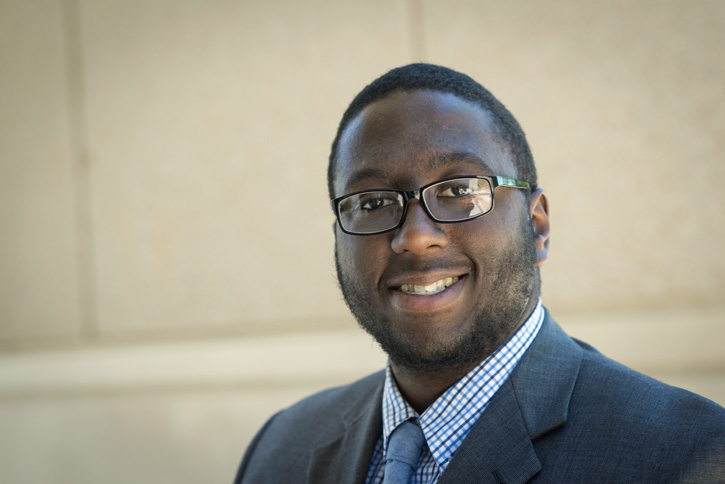
Michael Mingo-Dabney, '17 BS Finance, presented research on profit allocation in the retail and manufacturing industries at the National Undergraduate Research Conference. Photo by Evan Cantwell.
When it comes to understanding his potential career paths, Michael Mingo-Dabney has done the research.
The George Mason University senior decided to study finance because of the varied job opportunities it would make available to him. He added an economics minor to expand his business knowledge, and he will spend 27 months after graduation with the Peace Corps in Colombia.
“It’s the intermediary step between school and figuring out what it is I want to invest most of my time in,” Mingo-Dabney, who grew up in Virginia Beach, said of the Peace Corps. “I’m going to use that to transition into the business realm. Knowing the way I am, I’m going to go all in.”
Mingo-Dabney’s responsibilities in Colombia will mesh nicely with his academic pursuits.
Though not yet sure in what area of the country he will be assigned, he knows it will be rural and he will work as an advisor to help a nonprofit organization become a more efficient operation.
Mingo-Dabney is familiar with deep dives into the numbers. In an independent study research project he presented at this year’s National Conference on Undergraduate Research, he examined, as he described, “compensation differences between executives and nonsupervisory employees through the medium of stakeholder salience.”
Analyzing the data and explaining his research to a question-asking audience was a confidence booster, he said. Accompanying the George Mason student group, Engineers for International Development, to Nicaragua in January to help set up water and sanitation systems at an orphanage in the town of Puerto Cabezas, helped sharpen his Spanish.
“He’s fairly tenacious,” said Shelly Canterbury, a finance instructor in Mason’s School of Business and Mingo-Dabney’s research mentor. “He wants to give back, and undertaking these concepts will go a long way to whatever he chooses to do after the Peace Corps.”
Mingo-Dabney said he wants to consult for business firms in the United States and internationally.
“My family was always pushing me,” he said of his late grandfather, uncles and older male cousins. “They pushed me to be confident, taught me how to control my emotions, redirect my negative energy into constructive activity and how to lead a group.”
“As a black male, it really is a struggle to rise in the ranks, so you have to put that extra effort in to make sure everything is lined up,” he added. “I also saw where a lot of the people I went to high school with ended up, which is nowhere. I didn’t want to be in that mix. I want to make something of my life.”
